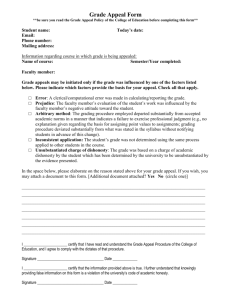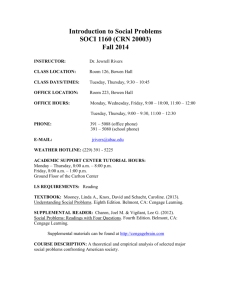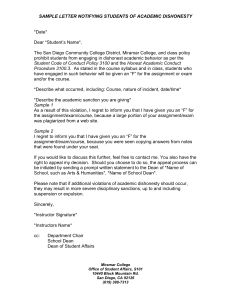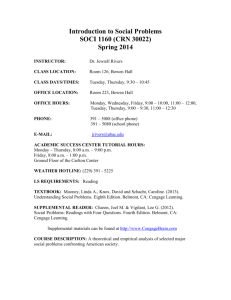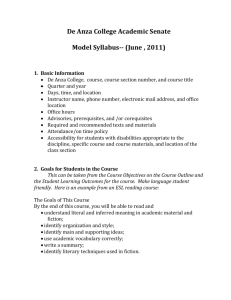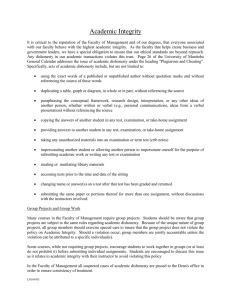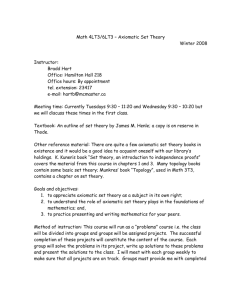Course Syllabus - Abraham Baldwin Agricultural College
advertisement
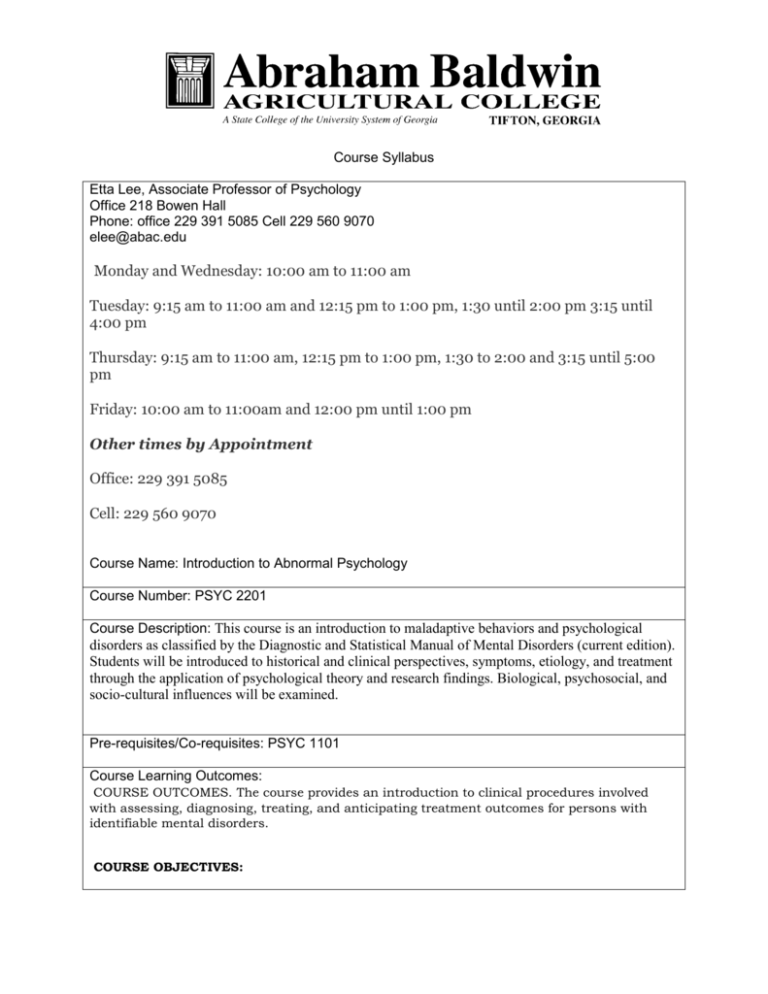
Course Syllabus Etta Lee, Associate Professor of Psychology Office 218 Bowen Hall Phone: office 229 391 5085 Cell 229 560 9070 elee@abac.edu Monday and Wednesday: 10:00 am to 11:00 am Tuesday: 9:15 am to 11:00 am and 12:15 pm to 1:00 pm, 1:30 until 2:00 pm 3:15 until 4:00 pm Thursday: 9:15 am to 11:00 am, 12:15 pm to 1:00 pm, 1:30 to 2:00 and 3:15 until 5:00 pm Friday: 10:00 am to 11:00am and 12:00 pm until 1:00 pm Other times by Appointment Office: 229 391 5085 Cell: 229 560 9070 Course Name: Introduction to Abnormal Psychology Course Number: PSYC 2201 Course Description: This course is an introduction to maladaptive behaviors and psychological disorders as classified by the Diagnostic and Statistical Manual of Mental Disorders (current edition). Students will be introduced to historical and clinical perspectives, symptoms, etiology, and treatment through the application of psychological theory and research findings. Biological, psychosocial, and socio-cultural influences will be examined. Pre-requisites/Co-requisites: PSYC 1101 Course Learning Outcomes: COURSE OUTCOMES. The course provides an introduction to clinical procedures involved with assessing, diagnosing, treating, and anticipating treatment outcomes for persons with identifiable mental disorders. COURSE OBJECTIVES: The student will be able to define abnormal behavior, supporting the definition by providing examples of situations where counseling or treatment could be advised or necessary. The student will understand and be able to discuss at least three theoretical perspectives with regard to the etiology and treatment of maladaptive behaviors. The student will recognize the symptoms of specific maladaptive behaviors. The student will be able to identify at least three treatment types and/or counseling modalities that lend themselves specifically to various types of abnormal behavior The student will understand the nature of maladaptive behaviors and the issues presented in the delivery of professional services as a counselor. Weather Hotline: 229-391-5225 College Policy on Course Attendance: Courses at Abraham Baldwin Agricultural College are provided for the intellectual growth and development of students. The interaction with instructors and other students is an important element of the learning process, and a high correlation exists between class attendance and course grades. Therefore to attain maximum success, students should attend all their classes, be on time, and attend all scheduled course activities. Absence from class, for whatever reason, does not excuse a student from full responsibility for class work or assignments missed. Students must accept this responsibility. Individual instructors will establish attendance policies for each class, will publish the policy in the course syllabus, and keep attendance records. The penalty for absences is at the discretion of the instructor and may include failure of the course. Whenever a student is absent, the student must assume responsibility for making arrangements for any assignments missed due to the absence. A student who stops attending class without officially withdrawing will still receive a grade for the course. A student penalized for excessive absences may appeal through the grade appeal process, as stated in ABAC’s college catalog and student handbook. INSTITUTIONAL ABSENCE A student who serves as an official representative of the college is defined as one who: 1. is authorized to use the college name in public relationships outside the institution; 2. regularly interacts with non-college individuals and groups over an extended period of time (at least one semester); 3. represents the college as a part of a group and not as an individual; 4. represents the college under the direct supervision of a college faculty or staff member; and 5. is authorized in writing, in advance, by the President of the college. Such a student is in no way released from the obligations and responsibilities of all students, but will not be penalized with unexcused absences when absences result from regularly scheduled activities in which he/she represents the college. Further, it is the responsibility of each student to contact instructors prior to the absence and to make arrangements to make up any work that will be missed, in a manner acceptable to the instructor. Advisors of activities will schedule off-campus activities in a manner that does not unduly disrupt the learning process for a student. College Policy on Academic Dishonesty: A. Academic Dishonesty Academic irregularities include, but are not limited to, giving or receiving of unauthorized assistance in the preparation of any academic assignment; taking or attempting to take, stealing, or otherwise obtaining in an unauthorized manner any material pertaining to the education process; selling, giving, lending, or otherwise furnishing to any person any question and/or answers to any examination known to be scheduled at any subsequent date; fabricating, forging, or falsifying lab or clinical results; plagiarism in any form related to themes, essays, term papers, tests, and other assignments; breaching any confidentiality regarding patient information. B. Disciplinary Procedures 1. If a student admits responsibility in a case of suspected academic dishonesty which does not involve a grade penalty significant enough to alter the student’s final grade in the course, the faculty member may handle the case on an informal basis by talking with the student and securing a signed statement from the student admitting responsibility and acknowledging the penalty to be imposed, if any. In all cases of suspected academic dishonesty in which the student does not admit responsibility or in which the grade penalty would alter the student’s final grade in the course, the faculty member will contact the Office of the Vice President for Academic Affairs. The Vice President for Academic Affairs will notify the student in writing of the report and will appoint a neutral person from among the faculty or staff to meet with the faculty member who reported the matter and the student(s) believed to have engaged in academic dishonesty. The purpose of the meeting, to be scheduled by the Office of the Vice President for Academic Affairs, will be to provide a facilitated discussion about what may have occurred. The faculty member who reported the matter, the student(s) believed to have engaged in academic dishonesty, and the facilitator are the only participants in the meeting. Audio nor video recordings of these proceedings will be permitted. Following the discussion, the facilitator will submit a form summarizing results of the proceedings to the Office of the Vice President for Academic Affairs. 2. The faculty member and student(s) may reach an agreement about the matter and, if dishonesty is involved, may determine the appropriate consequences. If no resolution is agreed upon, the matter will be forwarded to the Dean of Student Life and Housing, who will convene the Student Judiciary Committee to determine the outcome of the allegation. 3. Guidelines for disciplinary procedures as outlined in Section V of the Student Code of Conduct will be applicable in cases involving alleged academic dishonesty. A written copy of the recommendations by the Student Judiciary Committee shall be sent not only to the student but also to the faculty member who made the allegations of academic dishonesty against the student, to the Vice President for Academic Affairs, and to the President. 4. Prior to any finding of responsibility on the part of the student, the faculty member shall permit the student to complete all required academic work and shall evaluate and grade all work except the assignment(s) involved in the accusation of dishonesty. The faculty member may, however, take any action reasonably necessary to collect and preserve evidence of the alleged violation and to maintain or restore the integrity of exam or laboratory conditions. 5. A student may not withdraw from a course to avoid penalty of plagiarism or other forms of academic dishonesty. C. Appeals Process Students have the right to appeal a Student Judiciary Committee hearing recommendation in accordance with the following procedures: 1. Requests for appeals must be submitted in writing to the Office of the Vice President for Student Affairs within five business days of the date of the letter notifying the student of the original decision. Failure to appeal within the allotted time will render the original decision final and conclusive. 2. Written requests for appeals must be specific and detailed as to the nature and substance of the student’s complaint and must clearly indicate what action is requested. The written request should specify the grounds for appeal. Judicial recommendations may be appealed on the following grounds: • A violation of due process • Prejudicial treatment by the original hearing body • New evidence has become available which was not available at the time of the hearing. 3. Appeals shall be decided upon the record of the original proceedings, the written appeal submitted by the defendant, and any written briefs submitted by other participants. Cases will not be reheard on appeal. 4. If the student is dissatisfied with the decision of the Vice President for Student Affairs, the student may request in writing that the President consider the appeal, but such request must be made within five business days of the Vice President’s decision or the Vice President’s decision will be considered final and conclusive. 5. Within five business days of receiving the appeal, the President will either rule on the appeal or refer the appeal to a special Presidential Panel. The Presidential Panel will review all facts and circumstances connected with the case and within five business days make a report of its findings to the President. After consideration of the Panel’s report, the President will within five business days make a decision which shall be final so far as the College is concerned. 6. Should the student be dissatisfied with the President’s decision, written application may be made to the Board of Regents for a review of the decision. This application must be submitted within twenty days following the decision of the President. Additional information regarding procedures for appealing to the Board is available in the Office of the Vice President for Student Affairs. The decision of the Board shall be final and binding for all purposes. If there is a student in this class who has specific needs because of learning disabilities or any other disability, please feel free to contact the instructor. The Office of Student Development can also be reached, 229-391-5137. Grading scale A (90-100%) B (80-90%) C (70-80%) D (60-70%) F (less than 60%) Other warnings: Warnings (may result in lost participation points and/or removal from or denial to class) Texting, Texting, Texting, and Texting Reading material not related to the course during class Sleeping, talking, or sleeping and talking in class REPEATEDLY leaving the classroom before class is dismissed REPEATEDLY entering the classroom after class has started Making repetitive noises, i.e. clicking pens, popping gum, tapping shoes Talking out loud, whispering, rolling eyes or similar disrespecting behavior All make up work must be done in the time allotted and with prior approval. There will be 6 unit exams consisting of multiple-choice with possible short answer and essay questions and one paper. Each item is worth 100 points for a total of 700 possible. Break down of text material for exams Unit 1 Chapters 1,2,3,and 4 Unit 2 5, 6, and 7 Unit 3 Chapters 8,9, and 10 Unit 4 11, 12, 13 Unit 5 14, 15, 16 Unit 6 17, 18, 19 Information for the Profile Paper Movie Character Profile: Students will watch a movie specified on the attached pre-approved movie list and profile the movie character based on the disorder and related concepts presented in the text. The paper should be well written (typed), concisely detailed (4-5 double spaced pages), and include the following content: 1. Provide a brief introduction to the purpose and content of the paper. 2. List the complete DSM-IV-TR criteria necessary for a diagnosis of the specific disorder portrayed by the movie character. Be very specific, including specifiers or subcategories where appropriate. (You may bullet point the criteria.) 3. For each of the necessary diagnostic criteria (specified in 1 above), give specific examples of the abnormal thoughts, feelings, behaviors, etc. exhibited by the character to illustrate the symptoms. You should include examples of at least the minimum number of symptoms needed to diagnosis the specific disorder. 4. Describe the empirically supported treatment(s) for the diagnosed disorder. 5. Include in text citations and a reference page. Abnormal Psychology Pre-Approved Film List About Schmidt Girl Interrupted Silence of the Lambs As Good as it Hannibal Rising Silver Linings Gets I am Sam Austin Powers Beautiful Mind Leaving Las Vegas Playbook Benny and Joon Love Actually Single White Female Boys Don't Cry Magnolia Soloist Clockwork Orange Monster Sleeping with the Enemy Copycat Mr. Jones Stop Loss Crazy/Beautiful Nims Island The Aviator Dead Man Walking On Golden Pond The Good Son Dead Poet's Society Precious The Great Gatsby Dear John Radio The King’s Speech Donnie Darko Rain Man The Machinist Fight Club Secret Window The Notebook Fisher King Shutter Island The Vow Frankie and Alice What's Eating Gilbert Grape? Profile Paper Scoring Rubric Criteria: Possible Points: DSM-5 criteria Specific examples of diagnostic criteria Empirically supported treatments In text citations and references Overall quality of writing Points Earned: 20 15 10 5 0 30 General Missing 1 Missing 2 Missing 3+ omitted Complete Included criteria general criteria general criteria general general only – no (or) incorrect criteria criteria and relevant dx specifiers or specifiers subcategories 20 15 10 5 0 30 General Missing 1 Missing 2 Missing 3+ omitted Complete Included criteria example of examples of examples of examples of examples general criteria general criteria general general only –no criteria criteria and relevant specifiers or specifiers subcategories 16 12 6 0 omitted 20 complete but incomplete not empirically Complete & brief description supported detailed Described the empirically supported treatments in detail. 7 5 3 0 10 limited citations minimal in text Minimal in text omitted Complete Included in text & included a citations & citations & no citations and reference page included a reference page references as reference page needed 7 5 3 10 Good organization and Poor Poor organization and Professional Good organization quality organization and severe grammatical or and quality, moderate typing errors minimal
